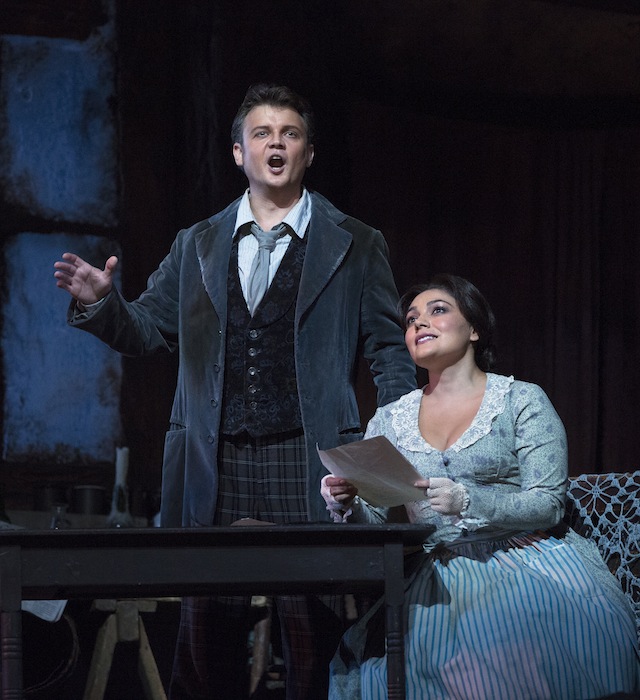Met’s “Bohème” offers vocal highlights with room for dramatic growth

Dmytro Popov and Ailyn Perez in Puccini’s “La Bohème” at the Metropolitan Opera. Photo: Marty Sohl
It’s baaaack. Franco Zeffirelli’s production of Puccini’s La Bohème, which has been wowing Metropolitan Opera audiences visually since 1981, seemed a little overwhelmed by its own grandeur in its first performance of the new season Wednesday night.
Directed with an admirable minimum of excess stage movement by J. Knighten Smit, the revival featured solid singing and flashes of inspired characterization. But the burdens imposed on Puccini’s fragile tale of love and loss by the elaborate grand-opera sets—and the interminable intermissions required to change them—were mostly not overcome on Wednesday.
One can hope that, as this production settles in, the jolly interaction of the four guys in their garret–and particularly the mock-duel of Colline and Schaunard across the rooftops of Paris–will look more spontaneous than they did on opening night.
The headline of this production going in was the Met debut of the Ukrainian tenor Dmytro Popov as Rodolfo, a role that had earned him glowing notices in London, Vienna and Munich. On Wednesday, Popov’s ringing, hall-filling high notes were indeed something to hear, but the subtler musical and psychological aspects of the role didn’t come through so clearly.
For those, one turned to the touching and musically idiomatic inflections of Ailyn Pérez as Mimì, whose judicious use of sliding attacks and portamento gracefully conveyed the Italian text while steering clear of the “operatic” conventions Puccini himself was puncturing in this intimate drama.
Together, however, Popov and Pérez generated plenty of heat in the radiant unisons of their love duets.
The three singers who portrayed Rodolfo’s pals also had ample vocal power, with bass-baritone Ryan Speedo Green as the philosopher Colline perhaps undersinging a little to compensate for his towering physical presence. As the character prepared to part with his beloved overcoat to buy medicine for Mimì, Green sang strongly and straight ahead, without conveying much of the mingled tenderness and absurdity of a man singing an aria to a coat.
Baritone David Bizic’s Marcello played an admirable Horatio to Rodolfo’s Hamlet. Bizic had less success in the more difficult business of projecting the conflicts within Marcello’s character—over his painting, his love for Musetta, and whether to help Mimì in Act III.
The musician Schaunard, as the only performing artist in this gang of four, is called upon (especially in this production) to hop on tables, strike attitudes, and wave baguettes like conductor’s batons, all of which baritone Rodion Pogossov did with panache.
It’s hard to blame soprano Susanna Phillips for this production’s clownish treatment of the character Musetta in Act II. Clad in a garish Little-Bo-Peep red dress and tossed around by strapping supernumeraries, Phillips sang in a fluttery, edgy voice that suited the low-comedy concept but conveyed little of the character’s seductive powers.
Bass Philip Cokorinos’s performance as Musetta’s elderly lover Alcindoro was largely obscured by the tumult of Act II’s crowd scene. Fortunately, Cokorinos had made the most of his moment in Act I as the landlord Benoit, plied with drink and prodded into comically lascivious admissions by the four roommates.
Chorus master Donald Palumbo, children’s chorus director Anthony Piccolo, and stage band conductor Gregory Buchalter all did their parts to bring off Act II’s eye-popping street scene with maximum energy and brilliance.
Carlo Rizzi led the Metropolitan Opera Orchestra through its 1,291stperformance of this score with humorous woodwinds or passionate strings as the dramatic situation demanded. Except for a little sagging here and there in the winds, Rizzi succeeded in keeping the players in the moment, despite the music’s familiarity.
All in all, the Met’s La Bohème opened Wednesday as a decent production with—as this cast and conductor stay together for four more performances—potential for growth.
La Bohème runs through Jan. 14, 2017. The current cast and conductor will perform the opera 8 p.m. Oct. 1 and 14, 7:30 p.m. Oct. 6 and 10. metopera.org


